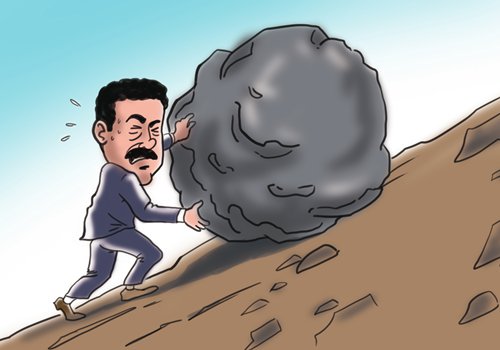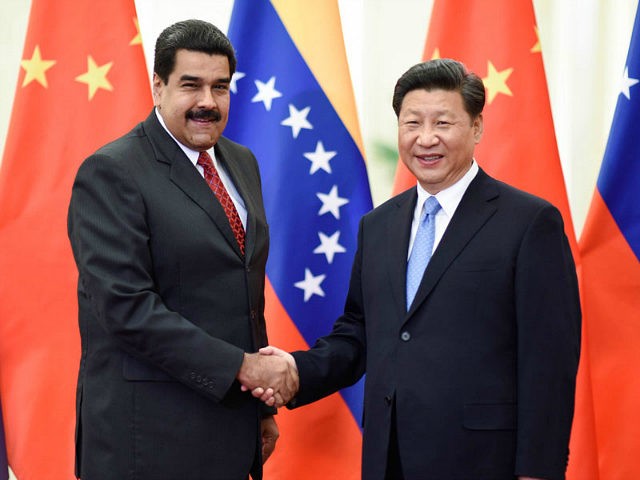The Spanish newspaper El País revealed this weekend that Chinese banks did not loan any funds to the socialist regime of Venezuela throughout 2017 and have yet to do so this year.
China remains one of Venezuela’s largest creditors but began expressing concerns that dictator Nicolás Maduro was mismanaging the economy, warning investors through its state media to flee the former “hot investment destination” in August. Its support of the socialist Maduro regime has resulted in one of the least profitable investments China has made in expanding its influence in anti-American regimes around the world.
“China has abruptly ceased issuing loans to Venezuela, coinciding with the deterioration of the economic and political crisis in the country,” El País reports. “For the first time in practically a decade, Chinese institutional banks did not lend any new credit to Caracas last year and have not yet in 2018 – an indicator that, according to sources consulted, corresponds with the Asian giant’s growing concern over the sustainability of its investments.”
El País cites the current amount of money Venezuela owes China to be around $62.2 billion, loaned between 2005 and 2016. Among the most pressing loans is a $19.3 billion sum that Venezuela received a two-year grace period on in 2016, which is rapidly set to expire.
In other reports released this year, El País found that China not only invested billions openly in Venezuela but accepted dubious business deals with affiliates of late dictator Hugo Chávez to enrich his family and cronies. In one such deal, the Chinese government allegedly paid millions to a cousin of one of Chávez’s closest advisors for “consulting,” opening doors for Chinese firms to do business in the country. The new report from the Spanish newspaper does not clarify whether these kinds of deals remain in vigor.
The Chinese Foreign Ministry told El País that the economic relationship between Venezuela and China “is functioning with no problems.”
The El País report corresponds with Reuters’ reporting in March, which found that China would not be lending any new money to Venezuela despite allowing some extensions of payment times for old loans – including the two-year grace period granted in 2016. Beijing, Reuters reported, was “ignoring” requests for more money, rather than rejecting them outright.
At the time, Reuters reported that China had begun to step back from the country “nearly three years ago,” shortly before the already collapsing Venezuelan economy plummetted into true hyperinflation.
Chinese state media began vocally warning the nation’s investors away from Venezuela in August.
“For a long time, Venezuela has been a hot investment destination in South America for Chinese firms. The country’s economy and social unrest exposes China’s commercial interests to huge risks,” the Global Times, a government-run newspaper, wrote at the time. “If a civil war really breaks out in Venezuela, then those Chinese business interests will be gone.”
The Global Times nonetheless asserted that China would not abandon its presence in Venezuela, home to the continent’s most staunchly anti-American regime and a colony of the only communist country in the hemisphere, Cuba. “It is impossible for China to pull out,” the newspaper insisted, warning, “Latin America should not be seen as the frontier of China’s influence.”
China’s oil and gas company Sinopec then sued the Venezuelan regime for failure to make payments in November. The lawsuit, filed in Texas, alleged that the state oil company Petróleos de Venezuela (PDVSA) “hid behind a complicated series of subsidiaries and affiliates” in a scheme to “defraud” Sinopec. The corporation alleged Venezuela owed $23.7 million, and interest and damages, for failing to pay on time.
That same month, Reuters reported in March, the Chinese ratings agency Dagong Global Credit Rating Co. downgraded Venezuela’s credit rating, placing it on negative watch. Dagong determined that “Venezuela lacks the ability to create wealth on its own” and concluded that “the somber outlook of the restructuring of its debt causes considerable uncertainty over the Venezuelan government’s ability to pay its expiring debts, which could create a high risk of default.”
Yet China has continued to support its choice to invest in the repressive Venezuelan regime. In February, following a condemnation from a U.S. Treasury official of China’s involvement in the South American nation, Chinese Foreign Ministry spokesperson Geng Shuang disparaged the Treasury as “irresponsible.”
“The loan contracts of both countries comply with international norms, laws and regulations, and the outcomes have benefited local people,” Geng insisted, adding that both sides brought to the table a “win-win spirit.”
“The China-Venezuela cooperation has promoted Venezuela’s socio-economic development and has been welcomed and supported by all walks of society,” Geng said.
For the first time since Maduro took power, however, China failed to issue him a full-throated message of congratulations following the end of a fraudulent election cycle on May 20 that resulted in an extension of his rule. Maduro prohibited true opposition candidates from running against him, instead only running against leftists and assorted chavistas. Even these candidates accused Maduro of fraud against them.
“Regarding the election in Venezuela, China has followed the principle of non-interference in others’ internal affairs as always, and we believe the Venezuelan government and people are capable of handling their domestic affairs,” Foreign Ministry spokesman Lu Kang told reporters the day after the “election.”
The Global Times, while claiming Maduro’s victory was a product of a “violent” and “divided” opposition – not noting the opposition was banned from participating in the election – also warned that Maduro has failed to control his country. A post-election analysis column warned “it will be no smooth sailing for [Maduro] as the country is mired in turmoil at home and abroad.” The election’s low turnout, an open protest against Maduro, “shows public disenchantment with the political process,” the Times admitted, accompanying the analysis with an unflattering political cartoon.

Via Global Times

COMMENTS
Please let us know if you're having issues with commenting.